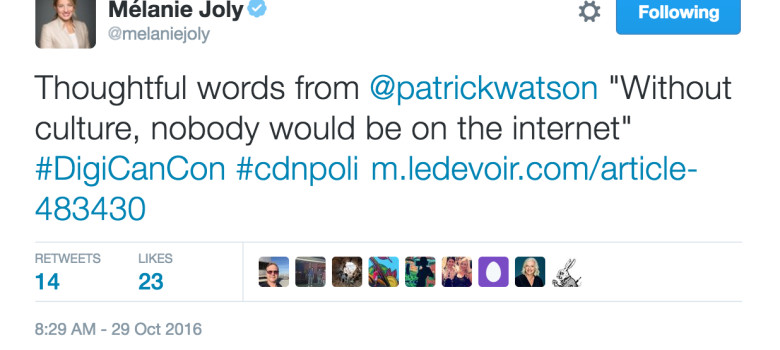Canadian Heritage Minister Melanie Joly hosted a public meeting in Montreal last week as part of her consultation on Canadian content in the digital world. The media reports from the event included a focus on comments from musician Patrick Watson, who is quoted as saying that no one would be on the Internet if there were no movies, television or music. Reports indicate that the comment generated support in the room and from Joly. In fact, hours later, Joly tweeted out “thoughtful words from @patrickwatson ‘without culture, nobody would be on the Internet'”.
If that really represents Minister Joly’s worldview on the Internet, there should be little doubt that an Internet tax will play a key role in her future plans. Claims that no one would be on the Internet without culture is demonstrably false, but it is consistent with the argument that Internet service providers and Internet companies owe their revenues to the cultural content accessed by subscribers and they should therefore be required to contribute to the system much like broadcasters and broadcast distributors.
The reality is that Internet use is about far more than streaming videos or listening to music. Those are obviously popular activities, but numerous studies (CIRA, Statistics Canada) point to the fact that they are not nearly as popular as communicating through messaging and social networks, electronic commerce, Internet banking, or searching for news, weather, and other information. From the integral role of the Internet in our education system to the reliance on the Internet for health information (and increasingly tele-medicine) to the massive use of the Internet for business-to-business communications, the Internet is about far more than cultural consumption. Indeed, given its importance to virtually all aspects of modern day life, there are few policy goals more essential than ensuring that all Canadians have affordable access to the network. Far from representing an updated approach to cultural funding, an Internet tax would unfairly target millions of Canadians, make access less affordable, and do little to “modernize” cultural funding policy.








Pingback: what is Canadian content? | Fair Duty
Pingback: Canadian Media Concentration Research Project - » Media and Internet Concentration in Canada Report 1984 – 2015
I see your blog needs some fresh & unique content. Writing manually is time consuming,
but there is tool for this task. Just search for: Digitalpoilo’s tools